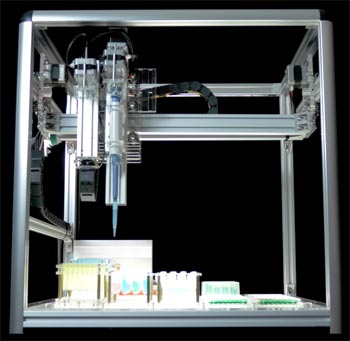"lab automation" entries

Smart collaborations beget smart solutions
Software developers and hardware engineers team up with biologists to address laboratory inefficiencies.
Download a free copy of the new edition of BioCoder, our newsletter covering the biological revolution.
Following the Synthetic Biology Leadership Excellence Accelerator Program (LEAP) showcase, I met with fellows Mackenzie Cowell, co-founder of DIYbio.org, and Edward Perello, co-founder of Desktop Genetics. Cowell and Perello both wanted to know what processes in laboratory research are inefficient and how we can eliminate or optimize them.One solution we’re finding promising is pairing software developers and hardware engineers with biologists in academic labs or biotech companies to engineer small fixes, which could result in monumental increases in research productivity.
An example of an inefficient lab process that has yet to be automated is fruit fly — Drosophila — manipulation. Drosophila handling and maintenance is laborious, and Dave Zucker and Matt Zucker from Flysorter are developing a technology using computer vision and machine learning software to automate these manual tasks; the team is currently engineering prototypes. This is a perfect example of engineers developing a technology to automate a completely manual and extremely tedious laboratory task. Check them out, and stay tuned for an article from them in the October issue of BioCoder. Read more…

Democratizing biotech research
The O'Reilly Radar Podcast: DJ Kleinbaum on lab automation, virtual lab services, and tackling the challenges of reproducibility.
The convergence of software and hardware, and the growing ubiquitousness of the Internet of Things is affecting industry across the board, and biotech labs are no exception. For this Radar Podcast episode, I chatted with DJ Kleinbaum, co-founder of Emerald Therapeutics, about lab automation, the launch of Emerald Cloud Laboratory, and the problem of reproducibility.
Kleinbaum and his co-founder Brian Frezza started Emerald Therapeutics to research cures for persistent viral infections. They didn’t set out to spin up a second company, but their efforts to automate their own lab processes proved so fruitful, they decided to launch a virtual lab-as-a-service business, Emerald Cloud Laboratory. Kleinbaum explained:
“When Brian and I started the company right out of graduate school, we had this platform anti-viral technology, which the company is still working on, but because we were two freshly minted nobody Ph.D.s, we were not going to be able to raise the traditional $20 or $30 million that platform plays raise in the biotech space.
“We knew that we had to be much more efficient with the money we were able to raise. Brian and I both have backgrounds in computer science. So, from the beginning, we were trying to automate every experiment that our scientists ran, such that every experiment was just push a button, walk away. It was all done with process automation and robotics. That way, our scientists would be able to be much more efficient than your average bench chemist or biologist at a biotech company.
“After building that system internally for three years, we looked at it and realized that every aspect of a life sciences laboratory had been encapsulated in both hardware and software, and that that was too valuable a tool to just keep internally at Emerald for our own research efforts. Around this time last year, we decided that we wanted to offer that as a service, that other scientists, companies, and researchers could use to run their experiments as well.” Read more…

A programming language for biology
Antha is a high-level, open source language for specifying biological workflows.
Editor’s note: This is part of our investigation into synthetic biology and bioengineering. For more, download the new BioCoder Fall 2014 issue here.

The OT.One liquid handling robot, photo courtesy of OpenTrons.
A programming language for scientific experiments is important for many reasons. Most simply, a scientist in training spends many, many hours of time learning how to do lab work. That sounds impressive, but it really means moving very small amounts of liquid from one place to another. Thousands of times a day, thousands of days in preparation for a career. It’s boring, dull, and necessary work, and something that can be automated. Biologists should spend most of their time thinking about biology, designing experiments, and analyzing results — not handling liquids. Read more…
